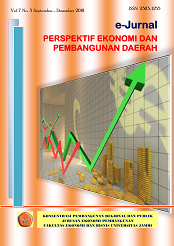Kajian sosial ekonomi pedagang ikan di Kuala Tungkal Kabupaten Tanjung Jabung Barat
DOI:
https://doi.org/10.22437/pdpd.v7i3.5526Abstract
This study aims to analyze 1) the socio-economic characteristics of fish traders 2) the effect of capital, working hours and business experience on income of fish traders. This research is survey research. The population in this study were fish traders in the two Kuala Tungkal markets namely Parit 1 Market and Parit Market 2. The sampling technique was saturated sample technique. Data were analyzed descriptively and multiple regression analysis models. The results of the study found that fish traders in Kuala Tungkal were characterized by the dominance of ages between 30-36 years, a low education level, generally married status, with a burden of 1-2 people. Fish traders' business capital ranges from Rp. 3 million to more than Rp. 100 million, with dominant working hours between 180 - 230 hours per month, and business experience between 1-5 years. The income of fish traders ranges from Rp. 1.4 million to Rp. 11.5 million with the largest proportion between Rp. 2.1 million to Rp. 3.8 million. Simultaneously, capital, working hours and business experience have a significant effect on the income of fish traders. Partially, capital and business experience have a significant effect while working hours have no significant effect on the income of fish traders.
Downloads
Downloads
Published
Versions
- 2018-12-12 (1)
- 2018-12-12 (1)
How to Cite
Issue
Section
License
Copyright (c) 2018 e-Jurnal Perspektif Ekonomi dan Pembangunan Daerah

This work is licensed under a Creative Commons Attribution 4.0 International License.


